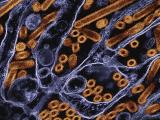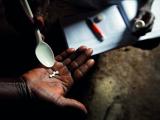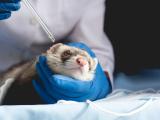Dec 14, 2010
Romania arrests two in H5N1 bribery scandal
Romanian authorities have arrested a government official and a businessman for allegedly defrauding the government during its response to 2006 outbreaks of H5N1 avian influenza in poultry, the Associated Press (AP) reported yesterday. The country's transportation minister is accused of receiving bribes to help a company that reportedly had no experience in disease control win a $7.95 million contract to assist with the response. The two were arrested on Dec 12 pending a trial.
Dec 13 AP story
TB cases spike in Canada's Nunavut territory
Health officials in Canada's Arctic Nunavut territory are fighting a rise in tuberculosis (TB) cases, 98 of which have been confirmed for 2010, the most in the territory's 11-year-history, the Toronto-based Globe and Mail reported yesterday. The area's TB rate is 62 times higher than Canada's national average. Dr Pamela Orr, an aboriginal disease expert at the University of Manitoba, told the Globe and Mail that the Nunavut, hit badly by the disease in the 1950s, has a high percentage of middle-aged and older residents who have latent infections from inadequately treated past disease. She said poor living conditions and latent disease provide fertile ground for such a TB outbreak. The Nunavut government is urging people to complete their antibiotic treatment by offering fast food incentives, and Health Canada has spent $9.6 million fighting the disease over the past year. Health officials are weighing other options for responding to the outbreak, such as a massive effort to improve socioeconomic conditions and a more aggressive antibiotic treatment strategy.
Dec 13 Globe and Mail story
WHO reports malaria control progress
Malaria control programs are showing steady progress toward international goals, such as providing antimalarial interventions to all who need them, the World Health Organization (WHO) said today in an update of a 2009 report. The WHO said a massive boost in malaria control efforts since 2008 has provided 578 million people in sub-Saharan Africa with insecticide-treated mosquito nets and protected 78 million people with indoor residual spraying, which represents 10% of the at-risk population. Eleven African countries reported greater than 50% decreases in malaria cases and deaths over the past decade, and 32 of 56 endemic countries outside Africa reported more than 50% drops in confirmed cases. Dr Margaret Chan, the WHO's director-general, said in a statement, "The results set out in this report are the best seen in decades." However, the WHO noted that malaria control is fragile in some areas, with resurgences in cases noted in Rwanda, Sao Tome, and Zambia. It said more work needs to be done to reach international targets. Though funding for control efforts rose to a record $1.5 billion in 2009, new financial commitments in 2010 appear to have leveled off.
Dec 14 WHO press release
WHO 2010 World Malaria Report
In a related development, three groups announced today that they are collaborating on a new approach for preventing malaria with a vaccine, according to a press release today from Merck, one of the groups. The other two collaborators are the Seattle-based PATH Malaria Vaccine Initiative and New York University Langone Medical Center. The new approach attempts to prevent the malaria parasite from entering the liver. The group is focusing on a region of the circumsporozoite protein, which would block the parasite from invading the liver. The new approach requires lower antibody levels than other strategies that target the protein. So far, it is being testing in children younger than 1 year old, but researchers hope it can be adapted for other patient populations and Plasmodium species.
















